-
Product Name
P62/SQSTM1 antibody
- Documents
-
Description
P62/SQSTM1 Rabbit Polyclonal antibody. Positive FC detected in HEK-293T cells. Positive IF detected in Starvation treated HepG2 cells, A431 cells, HeLa cells, MCF-7 cells. Positive IHC detected in human gliomas tissue, human heart tissue, human liver cancer tissue. Positive WB detected in HEK-293 cells, HeLa cells, Jurkat cells. Positive IP detected in HEK-293 cells. Observed molecular weight by Western-blot: 62 kDa
-
Tested applications
ELISA, WB, IHC, IP, FC, IF
-
Species reactivity
Human,Mouse,Rat; other species not tested.
-
Alternative names
P62 antibody; sequestosome 1 antibody; SQSTM1 antibody; Ubiquitin binding protein p62 antibody
- Immunogen
-
Isotype
Rabbit IgG
-
Preparation
This antibody was obtained by immunization of P62/SQSTM1 recombinant protein (Accession Number: NM_003900). Purification method: Antigen affinity purified.
-
Clonality
Polyclonal
-
Formulation
PBS with 0.02% sodium azide and 50% glycerol pH 7.3.
-
Storage instructions
Store at -20℃. DO NOT ALIQUOT
-
Applications
Recommended Dilution:
WB: 1:1000-1:10000
IP: 1:1000-1:10000
IHC: 1:20-1:200
IF: 1:20-1:200
-
Validations
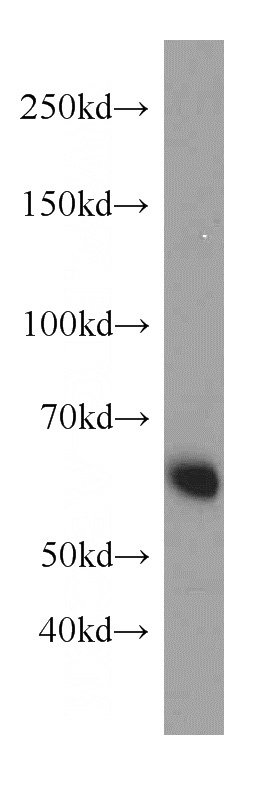
HEK-293 cells were subjected to SDS PAGE followed by western blot with Catalog No:113557(SQSTM1 antibody) at dilution of 1:1000
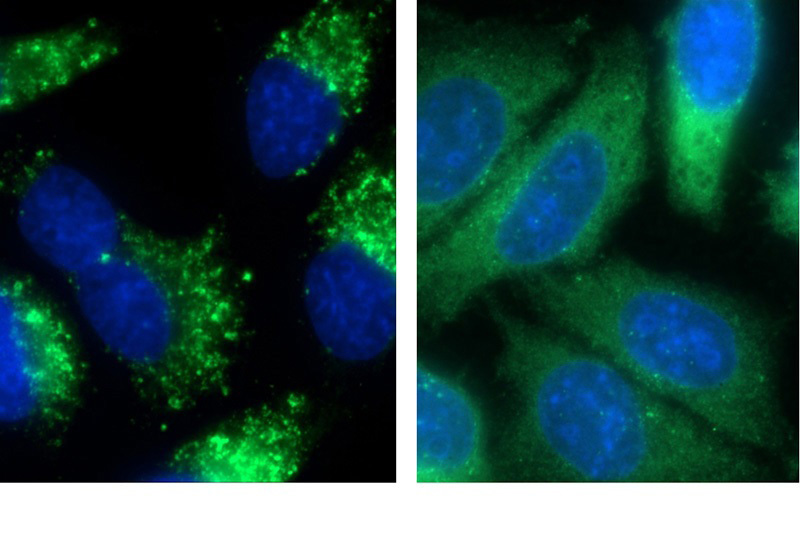
Immunofluorescent analysis of (-20oc Ethanol) fixed Starvation treated HepG2 cells using Catalog No:113557(P62;SQSTM1 Antibody) at dilution of 1:50 and Alexa Fluor 488-congugated AffiniPure Goat Anti-Rabbit IgG(H+L)
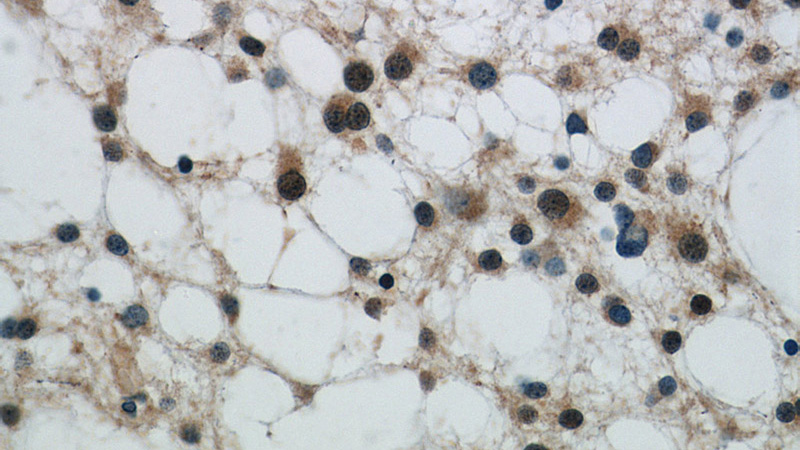
Immunohistochemical of paraffin-embedded human gliomas using Catalog No:113557(SQSTM1 antibody) at dilution of 1:50 (under 40x lens)
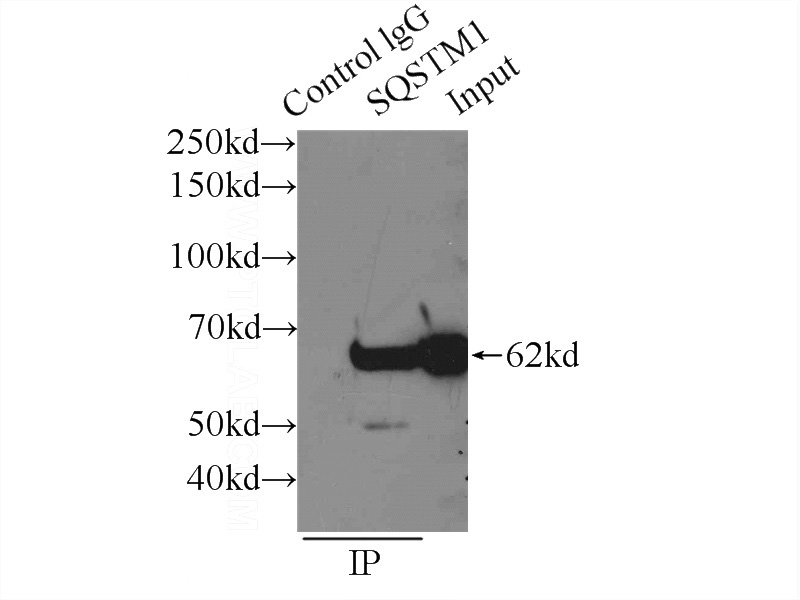
IP Result of anti-P62;SQSTM1 (IP:Catalog No:113557, 3ug; Detection:Catalog No:113557 1:2000) with HEK-293 cells lysate 1300ug.
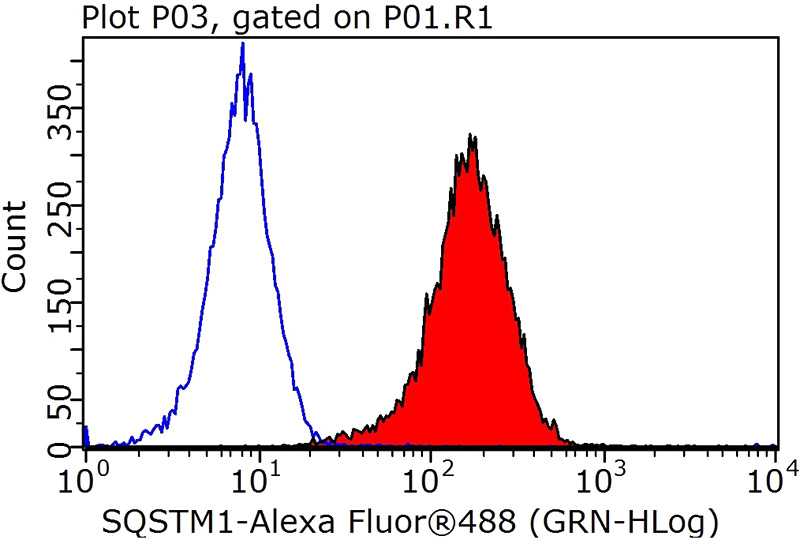
1X10^6 HEK-293T cells were stained with 0.2ug P62; SQSTM1 antibody (Catalog No:113557, red) and control antibody (blue). Fixed with 90% MeOH blocked with 3% BSA (30 min). Alexa Fluor 488-congugated AffiniPure Goat Anti-Rabbit IgG(H+L) with dilution 1:1000.
-
Background
Sequestosome 1 (SQSTM1/p62) is a multifunctional adaptor protein implicated in selective autophagy, cell signaling pathways, and tumorigenesis. p62 has been implicated in shuttling ubiquitinated and sometimes aggregated proteins for autophagic degradation. As a autophagy-specific substrate, p62 is degraded during the autophagic process, which makes intracellular level of p62 as a marker for autophagy flux. p62 is at the cross-roads of several signaling pathways including Ras/ Raf/ MAPK and NFκB and plays important role in cancer. p62 is a component of inclusion bodies/ protein aggregates found in human diseases, including Huntington's disease, Alzheimer's disease, Parkinson's disease in the brain, and nephropathic cystinosis in kidney (22074114, 22860231, 22714671). The molecular weight of p62 is predicted as 48/ 38 kDa, while western blot analyses using this antibody demonstrate the major band around 60-62 kDa in various tissues.
-
References
- Ching JK, Elizabeth SV, Ju JS, Lusk C, Pittman SK, Weihl CC. mTOR dysfunction contributes to vacuolar pathology and weakness in valosin-containing protein associated inclusion body myopathy. Human molecular genetics. 22(6):1167-79. 2013.
- Yao XF, Cao J, Xu LM. Perfluorooctane sulfonate blocked autophagy flux and induced lysosome membrane permeabilization in HepG2 cells. Food and chemical toxicology : an international journal published for the British Industrial Biological Research Association. 67:96-104. 2014.
- Bao LJ, Jaramillo MC, Zhang ZB. Nrf2 induces cisplatin resistance through activation of autophagy in ovarian carcinoma. International journal of clinical and experimental pathology. 7(4):1502-13. 2014.
- Sacino AN, Brooks M, Thomas MA. Intramuscular injection of α-synuclein induces CNS α-synuclein pathology and a rapid-onset motor phenotype in transgenic mice. Proceedings of the National Academy of Sciences of the United States of America. 111(29):10732-7. 2014.
- Fiesel FC, Moussaud-Lamodière EL, Ando M, Springer W. A specific subset of E2 ubiquitin-conjugating enzymes regulate Parkin activation and mitophagy differently. Journal of cell science. 127(Pt 16):3488-504. 2014.
- Gonzalez MA, Feely SM, Speziani F. A novel mutation in VCP causes Charcot-Marie-Tooth Type 2 disease. Brain : a journal of neurology. 137(Pt 11):2897-902. 2014.
- Sacino AN, Brooks M, McKinney AB. Brain injection of α-synuclein induces multiple proteinopathies, gliosis, and a neuronal injury marker. The Journal of neuroscience : the official journal of the Society for Neuroscience. 34(37):12368-78. 2014.
- Liang JX, Ning Z, Gao W. Ubiquitin‑specific protease 22‑induced autophagy is correlated with poor prognosis of pancreatic cancer. Oncology reports. 32(6):2726-34. 2014.
Related Products / Services
Please note: All products are "FOR RESEARCH USE ONLY AND ARE NOT INTENDED FOR DIAGNOSTIC OR THERAPEUTIC USE"
